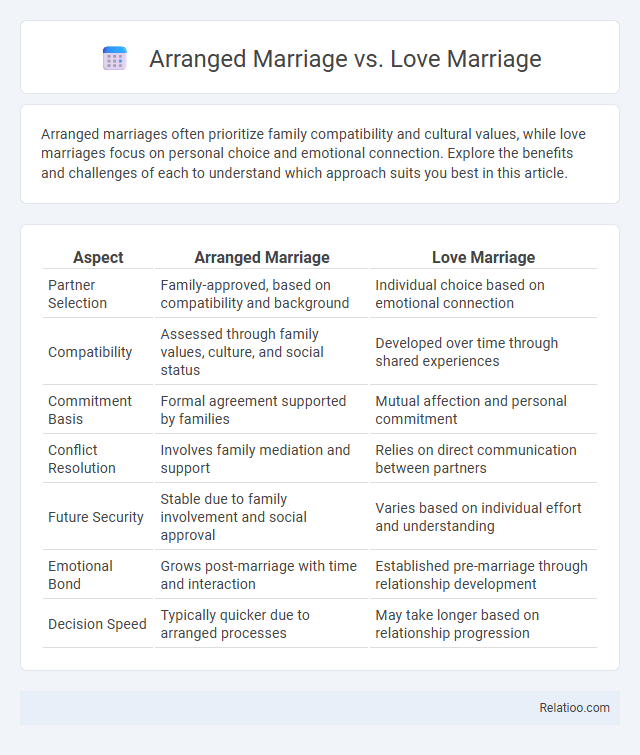Arranged marriages often prioritize family compatibility and cultural values, while love marriages focus on personal choice and emotional connection. Explore the benefits and challenges of each to understand which approach suits you best in this article.
Table of Comparison
| Aspect | Arranged Marriage | Love Marriage |
|---|---|---|
| Partner Selection | Family-approved, based on compatibility and background | Individual choice based on emotional connection |
| Compatibility | Assessed through family values, culture, and social status | Developed over time through shared experiences |
| Commitment Basis | Formal agreement supported by families | Mutual affection and personal commitment |
| Conflict Resolution | Involves family mediation and support | Relies on direct communication between partners |
| Future Security | Stable due to family involvement and social approval | Varies based on individual effort and understanding |
| Emotional Bond | Grows post-marriage with time and interaction | Established pre-marriage through relationship development |
| Decision Speed | Typically quicker due to arranged processes | May take longer based on relationship progression |
Introduction: Understanding Arranged and Love Marriages
Arranged marriages involve families selecting partners based on social, cultural, and economic compatibility, emphasizing tradition and long-term stability. Love marriages prioritize personal choice and emotional connection, with partners choosing each other based on mutual affection and shared values. Romance in both contexts plays a crucial role in fostering intimacy and strengthening the marital bond over time.
Historical and Cultural Background
Arranged marriage has deep historical roots in many cultures, particularly in South Asia and the Middle East, where familial alliances and social status were prioritized over individual choice. Love marriage emerged as societies shifted towards valuing personal freedom and romantic love, especially in Western cultures during the Enlightenment and Industrial Revolution. Your understanding of these customs can enhance cultural sensitivity and highlight how romance, whether within arranged or love marriages, continues to shape relationship dynamics globally.
Key Differences Between Arranged and Love Marriage
Arranged marriage involves families selecting partners based on criteria like social status, caste, and compatibility, emphasizing community approval and long-term stability, while love marriage is based on individual choice, emotional connection, and mutual attraction. In arranged marriages, relationship development often occurs after marriage, contrasting with love marriages where couples typically date and build intimacy prior to commitment. Romance in love marriages plays a central role in fostering emotional bonds, whereas in arranged marriages, romance may evolve gradually as the couple adjusts to married life.
Role of Family and Society
In arranged marriages, family involvement plays a decisive role by selecting partners based on cultural values and social compatibility, reinforcing societal norms and support systems. Love marriages prioritize individual choice and emotional connection, often challenging traditional family expectations and societal conventions. Romance serves as the emotional foundation in both contexts but is more explicitly central in love marriages, where personal affection guides the union rather than familial arrangements or social obligations.
Decision-Making Process
The decision-making process in arranged marriages often involves family input and cultural traditions prioritizing compatibility and long-term stability. In contrast, love marriages emphasize individual choice, emotional connection, and mutual attraction as primary factors. Romance plays a key role in love marriages by fostering emotional intimacy and passion, while arranged marriages rely more on pragmatic considerations and collective agreement.
Compatibility and Long-Term Outcomes
Compatibility plays a crucial role in determining the success of arranged marriages, love marriages, and romantic relationships, with arranged marriages often benefiting from family vetting and cultural alignment, while love marriages rely heavily on personal connection and emotional bonding. Long-term outcomes tend to show that arranged marriages can develop strong compatibility over time through shared values and commitment, whereas love marriages and romances may face challenges if initial passion isn't supplemented by mutual understanding and adaptability. Your satisfaction in any relationship depends on the balance between emotional intimacy, communication, and aligned life goals, which influence both compatibility and enduring happiness.
Challenges and Misconceptions
Arranged marriages often face misconceptions about lack of love and compatibility, yet they require significant efforts in building trust and understanding over time. Love marriages encounter challenges related to familial acceptance and societal pressure, which can strain the relationship despite initial emotional connection. Romantic relationships, while built on passion, may struggle with sustaining commitment and managing expectations without a foundation of shared values and mutual respect.
Social Acceptance and Stigma
Arranged marriages often receive higher social acceptance in traditional communities due to cultural norms and family involvement, reducing stigma compared to love marriages, which may face resistance for prioritizing individual choice over collective values. Love marriages challenge conventional customs, resulting in varied societal reactions ranging from support to stigma depending on regional and generational factors. Romance, especially outside the framework of marriage, is frequently stigmatized in conservative societies, with social acceptance largely influenced by prevailing cultural attitudes and legal frameworks.
Success Rates and Divorce Statistics
Arranged marriages report success rates often exceeding 80% in countries like India due to strong family support and cultural alignment, while love marriages show varied success depending on individual compatibility and social factors. Divorce rates for love marriages tend to be higher in Western societies, averaging around 40-50%, compared to arranged marriages, which exhibit significantly lower rates, often below 10%. Romance-driven relationships focus on emotional connection and passion, which may decline over time, impacting long-term stability and resulting in a wider range of success and divorce outcomes.
Choosing What’s Right for You
Choosing between arranged marriage, love marriage, and romance hinges on understanding your personal values, cultural background, and long-term goals. Arranged marriages often emphasize family involvement and compatibility based on shared traditions, while love marriages prioritize individual choice and emotional connection. Your decision should reflect what aligns best with your happiness, trust, and mutual respect in a lifelong partnership.

Infographic: Arranged Marriage vs Love Marriage
 relatioo.com
relatioo.com